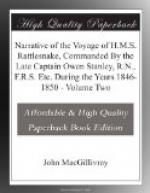Weighed in the afternoon with a very light air from South-West, and stood to the North-West, but by sunset, when we anchored in 27 fathoms mud, we had made only about eight miles. The weather was very sultry all day with the thermometer from 82 to 84 degrees in the shade. In the evening we got a land breeze from about east, which lasted most of the night.
MORE NATIVES VISIT US.
September 26th.
Soon after daylight we were visited by a party of natives who came from an opening in the low land at the north-east corner of the bay—apparently the mouth of a large river. They were in three canoes carrying respectively, seven, four, and three people, and paddled up alongside without hesitation, appearing anxious to be admitted on board, holding on by the chains and peeping into the ports in a most inquisitive manner. With the exception of two or three coconuts nothing was brought to barter with, but they readily parted with bows and arrows, of which they had a very large supply. These bows appear to be made of the hard heavy wood of the coconut-tree, pointed at each end, and varying in length from five to six feet, with a greatest width of an inch and a quarter and thickness of five-eighths. The string is a strip of rattan three-eighths of an inch wide. The arrows are precisely similar to those used by the Torres Strait Islanders, consisting of a head of coconut wood, nine to eighteen inches in length, shipped into a light reed 2 1/2 to 3 1/2 feet in length, and secured by a neat cane plaiting. They are variously barbed on the edges in one or more series, or furnished with constrictions at short intervals which would cause a piece readily to break off in a wound and remain there. Some were headed with a piece of bamboo shaped like a gouge or scoop, and several other varieties were observed. This is the first occasion of our meeting with these weapons, which appear almost completely to have superseded the spear of which only a few small ones were seen in the canoes. In exchange for their bows and arrows the natives attached most value to articles of clothing of every description. Glass bottles were also eagerly sought after—but iron was not prized—indeed its use appeared to be unknown, nor had they any name for it.
BAMBOO KNIFE.
While leaning out of one of the wardroom ports, and getting words from a very intelligent native whose attention I secured by giving him various little presents from time to time, I had occasion to point to a bamboo scoop* lying in the canoe in order to get its name. The man, to my surprise, immediately bit off a narrow strip from one side, as if to sharpen the edge, and taking up a piece of stick, showed me that this scoop was used as a knife. Not to be outdone I took one of our common knives and cut away vigorously at a piece of wood to show the superiority of our knives over his one; he appeared suddenly to become terrified, talked vehemently to the others, drew their attention to me, and repeated my motions of cutting the wood, after which his canoe pushed off from the ship’s side. My friend refused to accept of the knife—as I afterwards found the natives had also done to other people when iron implements were offered them—nor would he pay any further attention to my attempts to effect a reconciliation.




